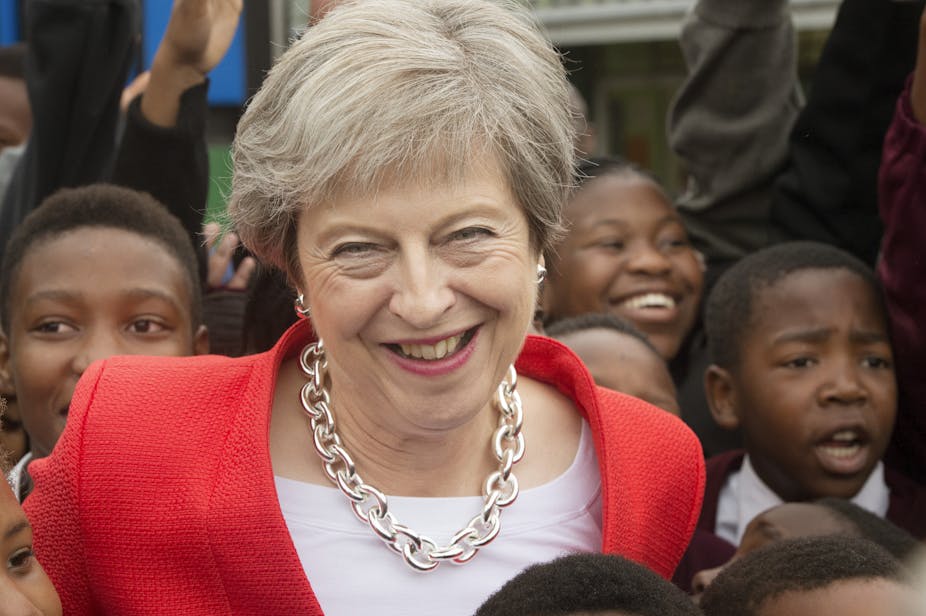British Prime Minister Theresa May is visiting Kenya as part of a trip to Africa that also included stops in two of the continent’s largest economies – South Africa and Nigeria. The Conversation Africa asked Kenyatta University’s Leah Barasa to unpack the key issues that will shape talks between May and Kenya’s President Uhuru Kenyatta, and why the British leader placed Kenya on her itinerary.
What is the context of May’s visit to Kenya?
May’s visit symbolically reaffirms the UK’s leadership role in Anglophone Africa. At the same time, it aims to strengthen trade links as her country prepares to leave the European Union.
During her speech in Cape Town this week – the first stopover on her African tour – May set a target for the UK to become the leading G7 business investor in Africa by 2022. This is part of her bid to promote a post-Brexit agenda.
British direct investment in Africa was USD$55 billion in 2016, just behind the US’s USD$57bn but ahead of USD$49bn from France and USD$40bn from China. May’s visit comes amid increased interest by China and France.
The UK has a long history of direct investment in Africa. But it has recently faced growing competition from China.
Trade and investment are on the agenda during May’s visit. What are the likely highlights?
The UK is Kenya’s second most important export destination. Kenya mainly exports tea, coffee and horticultural products. The UK accounts for 27% of Kenya’s fresh produce exports and 56% of its tea exports. Motor vehicles, printed materials, machinery and chemicals form the bulk of imports to Kenya from the UK.
Kenya exported a total of 133,658.3 tonnes of cut flowers, earning 70.8 billion shillings, or 70% of the 2016 horticultural earnings. The UK is also the second largest source market for Kenya’s tourism. Kenya is therefore likely to bring up its dissatisfaction with frequent UK travel advisories which affect arrivals.
Currently, there are over 300 British companies based in Kenya making the UK the largest European foreign investor in the country.
The UK’s investment agenda will be particularly good news for Kenyatta, who is in his second and final term. The visit offers an opportunity to promote investments in Kenyatta’s Big Four agenda. This places affordable housing, universal health care, food security and manufacturing growth at its heart.
What’s likely to change after the UK leaves the EU?
The commercial ties will remain strong because Britain remains a key importer of Kenya’s goods. The existing collaboration on security, which includes hosting training facilities for 7,500 British troops every year, are also unlikely to be affected. The main impact will be felt by businesses that export to both the UK and EU markets because they will face separate tariff regimes and export rules.
In addition, people travelling on business across Europe will face additional visa and trade rules.
Kenya’s battle with corruption will be on the agenda. What can be expected?
The likely focus will be on cooperation, particularly in technical capacity building such as forensic investigations and strengthening systems to deliver services at both national and county governments. Strengthening service delivery systems will build institutional capacity, reduce graft and improve the quality of services.
Additionally, the UK government could pledge to cooperate with Kenya in tracing and handing back illicit funds banked in its jurisdiction. Funds derived from some of Kenya’s big financial scandals involving public funds in the early 2000s were banked in the UK. In one case, the Kenyan government paid a UK company for goods that were never delivered.
Kenya has suffered setbacks in its attempts to build strong institutions, including those fighting corruption. But in the past the pattern was one step forward and two steps backwards. The trajectory is looking more positive. The UK could keep Kenya on this trajectory by signing a deal similar to one with Switzerland, under the United Nations Convention against corruption that guides the recovery of stolen assets.
Regional security is also on the agenda. What will be discussed?
Kenya is an important security player in the East African region. Its troop contribution to the African Union’s peacekeeping mission in Somalia is critical to regional security. Talks between the two countries are likely to centre on collaborative efforts to tackle radicalisation and violent extremism.
Kenya’s contribution to regional peace is also exemplified by the hosting of more than 450,000 refugees from the region. This has emerging security challenges for Kenya in the form of violence instigated by some refugees. Talks could focus on UK support for investing in human capital, developing physical infrastructure for the migration department, and the use of technological advancement in surveillance of refugees at the port of entry.

